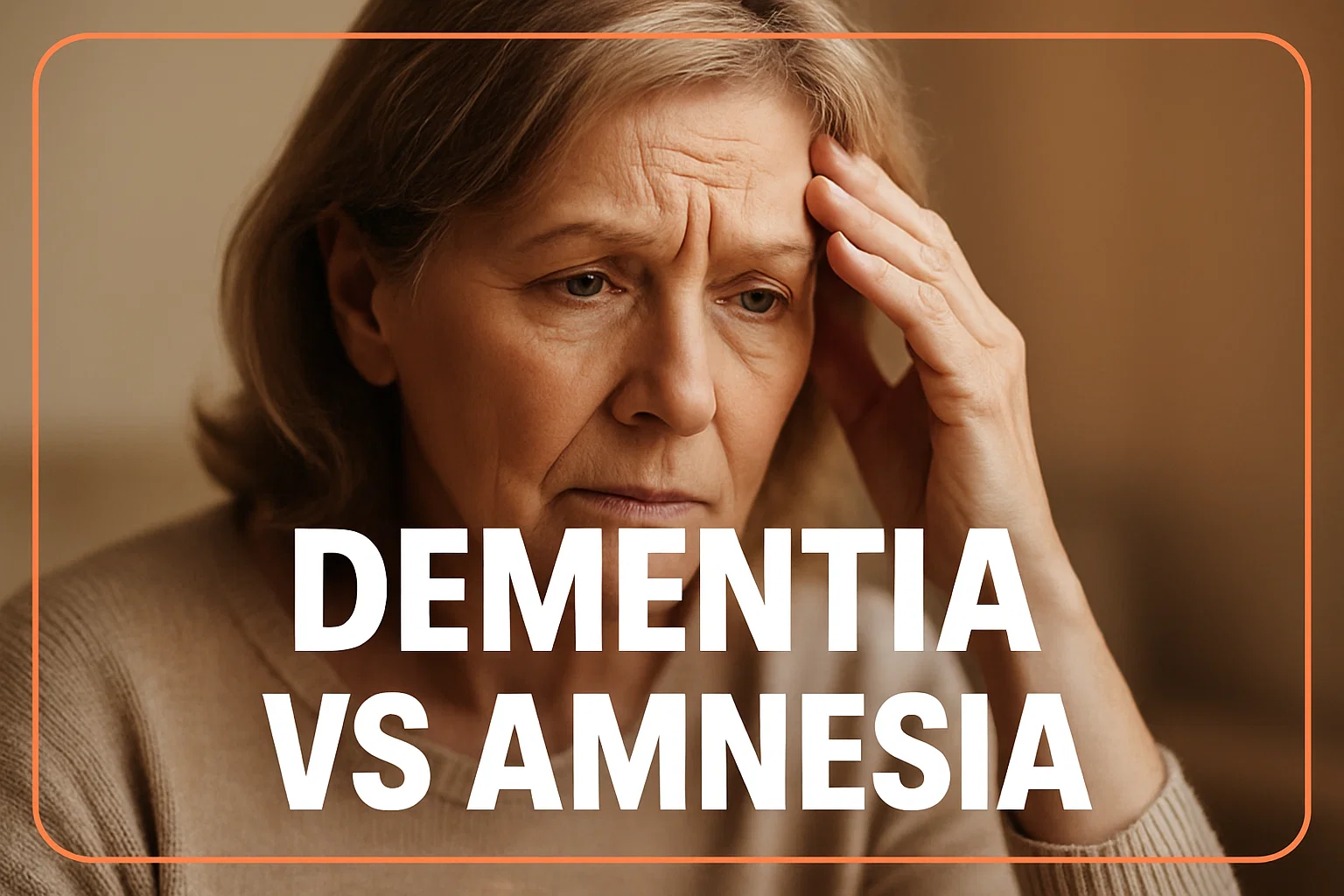Dementia vs Amnesia: Understanding the Key Differences and How They Affect Memory
It can be very scary and confusing when one of your beloved family members or friends begins to forget things. “Could it be dementia? Or is it amnesia?” Both dementia and amnesia impair memory, but they are very different. Recognizing their key differences can help you identify early warning signs, access appropriate care and better care for loved ones.
In this blog post we will go through what dementia and amnesia are, how they affect memory, the causes of each, symptoms, treatment and a few ways that you can tell the difference between them.
Understanding of Dementia
Dementia is not a specific disease, but rather a general term for the decline in mental ability severe enough to interfere with daily life. In addition to memory loss, Dementia Patients can also cause issues with reasoning, problem-solving, language, and behavior.
Common Types of Dementia
There are several types of dementia, all of which have different symptoms or causes. The most common types include:
Alzheimer’s disease: The most common type, characterized by a slow decline in memory and reasoning.
Vascular dementia: A result of impaired blood supply to the brain, frequently after a stroke.
Lewy body dementia: Features include hallucinations and movement problems.
Frontotemporal dementia: Personality, behavior and language are affected.
Both types attack specific regions of the brain and feature slightly different symptoms.
Key Symptoms of Dementia
Dementia symptoms will depend on the variety and stage, but common signs include;
- Loss of memory, particularly events over the last few weeks
- Difficulty planning or solving problems
- Difficulty with familiar tasks (e.g. following a recipe or paying bills)
- Disorientation to time or place
- A change in a person’s mood, personality or social behaviour.
- Difficulty using words, like speaking in patterns or forgetting common words
- Dementia also progresses over time, gradually making it more difficult for a person to live independently.
Understanding of Amnesia?
Amnesia specifically refers to a decline in memory – ranging from a complete loss of memory to a partial loss of memory. Unlike dementia, amnesia generally does not affect a person’s intelligence, consciousness or personality. Mostly, it affects the storage or recollection of memories.
Main Types of Amnesia
Different types of amnesia based on the nature and cause:
- Anterograde amnesia: an inability to create new memories following the onset of the amnesia.
- Retrograde amnesia: The inability to remember events that occurred before an injury or accident.
- Transient global amnesia: A sudden onset of complete memory loss that has no known cause.
Unlike in dementia, amnesia can either be temporary or resolves over time, also depending on the cause.
Common Symptoms of Amnesia
Amnesia symptoms typically include:
- Trouble remembering new information or experiences, or even old memories.
- Trouble learning new information
- Gaps in memory (blank periods)
- Confusion or disorientation during periods of memory loss
- Although, dementia involves more than one cognitive function, amnesia affects only the memory.
Causes of Dementia
Dementia occurs when damage to brain cells interferes with the brain’s ability to communicate. Specific causes are linked to specific types of dementia:
Alzheimer’s disease: Excess protein deposits and loss of neurons in various parts of the brain
Vascular dementia: Blood flow to the brain was blocked or narrowed in a blood vessel impaired by stroke or vessel damage
Frontotemporal dementia: Damage to certain nerve cells in the front lobe of the brain or in the temporal lope.
Lewy body dementia: Clumps of abnormal proteins (Lewy bodies) are found in the brain cells.
Risk factors include aging, genetics, cardiovascular disease, diabetes, and lifestyle factors such as smoking or lack of exercise.
Causes of Amnesia
Most often, amnesia is the result of an event that directly damages the brain regions that help the brain learn and remember like:
- TBI (Traumatic Brain Injury)- From car accidents to falls
- Stroke
- Brain infections (e.g., encephalitis)
- Lack of oxygen to the brain
- Emotional trauma (e.g., dissociative amnesia)
- Substance abuse or toxic exposure
- There are also drugs or seizures that can lead to a temporary or permanent memory loss.
How They Do Not: Dementia vs Amnesia
It can be easy to conflate the two, but knowing their differences is critical to making a correct diagnosis and getting the right care.
Memory Loss Patterns
Dementia leads to slowly progressing memory loss, which increases with time. It starts with short-term memory problems and extends to long-term memory and other abilities.
Memory loss is likely to be acute, occurring suddenly and being confined to certain memories or to the capacity to create new ones.
Cognitive Impact
Dementia involves a spectrum of mental health that includes decision making and the language with which we communicate, as well as simply the judgment we exhibit.
Memory is the predominant function affected by amnesia while other aspects of cognition similar to identity and self-consciousness can be relatively retained.
Progression and Prognosis
Dementia is also progressive and essentially irreversible, at least in something like Alzheimer’s.
The amnesia can be temporary or leave the person with partial memory loss. Some recover fully as time passes and with treatment.
Diagnosis and Evaluation
How Dementia is Diagnosed
Doctors generally use a battery of tools to diagnose dementia:
Cognitive tests: Memory, reason, language, problem-solving evaluations
Neurological examination: Examination of reflexes, coordination, and brain function
Neuroimaging: MRI or CT scans to find any abnormalities
Blood tests: to check for vitamin deficiencies, problems with your thyroid or signs of infection
If it is, early diagnosis helps manage symptoms and plan for what lies ahead.
How Amnesia is Diagnosed
Amnesia diagnosis involves:
Neurological examination: To evaluate memory and exclude other causes
Cognitive tests: When working out which areas of memory are damaged
Imaging: with CT or MRI scan to help determine brain injury or damage
Conclusion
Although both dementia and amnesia result in memory loss, they are two different conditions as they affect the brain’s and the body’s functioning in different ways. Dementia is a long-term, gradual decline of cognitive function that is not reversible and is marked by multiple deteriorations that are accelerated by time. Amnesia, by contrast, is generally sudden and narrower, tending to involve either gaps in or difficulty establishing memories, and is often more reversible. Understand what the main differences are between dementia and amnesia and what you can do to take action early, provide good medical care, and support the patients as best you can.
At Precious Pearls Health Home Care, we provide personalized, dependable support for Seniors Care and individuals with special needs, right in the comfort of their homes.
FAQS
Yes, it’s possible. With advanced dementia, there can be such profound memory loss that it appears like amnesia, but some people have overlapping conditions.
Not always. Most varieties of amnesia, especially that resulting from trauma or temporary events in the brain, may improve over the long term with appropriate treatment.
Be patient, follow a structured schedule, use an aide’s memoire, and seek medical assessment for the cause.






